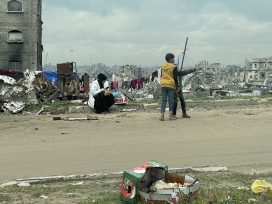
Spending time with the dead
Ord&Bild 2-3/2025
Parables of violence; memories of dictatorship; perversions of memory: Ord&Bild samples contemporary Latin American literature and photography.
In Entretiens (the book of interviews with André Parinaud broadcast on radio in 1952) André Breton reminisces about more than three hundred people whom he met or who influenced his thinking and the Surrealist movement. He mentions André Gid three times and Jean-Paul Sartre four times, for example. It is interesting that in the book two names are absent. The first is that of the writer Louis Ferdinand Céline.
History played a strange game, however, when Breton and Céline both appeared on the list of people who should have been killed. In her commentary on Céline’s “D’un château à l’autre” Anna Kareninová writes:
In La Tribune des Nations of January 13, 1950, in the article entitled “We won’t spare Louise Ferdinand Céline”, Roger Vailland describes how the resistance group Céline belonged to decided to kill him in 1943. Céline lived in rue Girardon, right above the apartment where the resistance group used to meet. In his trilogy, Céline mentions several times how Roger Vailland always regretted not having killed Céline.
Céline expresses his concerns in his novel:
“…in rue Girardon where I lived at that time, it was crystal clear that they would do me in …”
And continues:
“… Vailland should take care of me … that reluctant murderer of mine …”
Vailland himself, in his novel Drôle de jeu, proves that Céline’s concerns were justified. Let’s quote again:
Céline lives above us. Any time there is a noise in my place, he thinks we are going to kill him. Are we? Why don’t we kill him indeed? You want to put me into jail. Where would you go to take a bath and where would you go for a chocolate?
A truly strong argument from a writer who supported Stalinism. He was right in one thing – Céline really was afraid. He chose to flee from those “liberators” to Germany and it was many years before he was fully rehabilitated.
The other name which is missing in Breton’s Entretiens is, surprisingly, C.G. Jung. The Surrealists were interested mainly in the scientific discoveries of Freud. It is almost unbelievable that Jung’s ideas, which are so close to Surrealist philosophy, escaped Breton’s attention. What Breton describes in Nadja as incredible and miraculous coincidences, Jung defines as synchronicity. Breton’s following work entitled “Arcane 17”, named after tarot cards, is another sign of his esoteric understanding, which Jung interprets so brilliantly.
Rarely in the history of thought have two worlds which are so close missed one another.
Vysoké nad Jizerou, February 27, 2005
America, or rather the United States of America, is a country where prudery is considered an undoubted virtue. We met there with an elderly lady who told us that an appointment at a gynaecologist’s is absolutely unacceptable for her. On another occasion a young, pretty Czech girl who had been living in the States for several years described her first encounter with a gynaecologist. She took her clothes off behind a screen and the doctor was shocked. She was supposed to wear a paper garment for the examination with a hole in it intended for the doctor’s work. Not even the youngest girls, three- or four-year-olds, are allowed to go to a beach without the top part of their swimming costumes.
A striptease show is cute in its absurdity. A girl dances around the popular pole, stripping slowly and teasingly looking into the eyes of men in the first row. But she leaves her knickers on, she doesn’t take them off. They are very small but they represent the general notion of morality. In our country it is not unusual to see women undressed like that sunbathing at public swimming pools.
Last week I happened to watch the American television series Baywatch. One seldom comes across so many lies all at one time. For on American beaches you see mostly plump and very fat American women. Obesity is a serious problem in that country. Pretty girls – and there are only attractive young people in this series, mainly girls – are imported from all over the world, particularly from Europe. In the episode I watched, a handsome, young, and single man helped a young girl to deliver a child in the sand on an empty beach. Due to the clumsy director and the need to try to meet local concepts of what is moral, the girl gave birth to a beautiful child without taking her knickers off.
It is neither funny, nor contemptible. We all know very well that one hundred years ago a bare female ankle was far more sexy than a walk on a nudist beach. However, such a walk fits in with our idea of paradise as we feel completely free. Perhaps even happy because we cannot imagine anything more beautiful than a naked human body on the seashore. This view combines everything that yogis continue to search for with great effort and in vain. A seemingly endless water surface and a desire connected with nudity is the direct way to an open future, that is, to eternity.
Vysoké nad Jizerou, Wednesday June 25, 2001
Television channels broadcast a number of programmes during the day that are intended to be slightly entertaining and slightly informative. They bear titles like Home Alone, Pleasure Ride, and all kinds of others.
A long time ago I saw a programme on teaching English in the US. The tutor told a pupil: “Be positive!” It was a command rather than a piece of advice. I felt the pupil trembling with fear when trying, as hard as she could, to be positive.
It is as if the female presenters of these programmes are trying to follow this command. They keep imposing their professional happiness on us. They often laugh aloud while speaking, at times when there is no reason to. They don’t smile, they actually laugh out loud. Often, regularly, for a long time.
A shiver runs down my spine when I see this; and I don’t think I’m the only one.
Vysoké nad Jizerou, July 24, 2001
Published 10 April 2007
Original in Czech
First published by Revolver Revue 66 (2006) (Czech version)
© Ivo Vodsed'álek / Revolver Revue / Eurozine
PDF/PRINTSubscribe to know what’s worth thinking about.

Parables of violence; memories of dictatorship; perversions of memory: Ord&Bild samples contemporary Latin American literature and photography.

‘Since leaving Khan Younis, I have not felt whole. The knowledge that complete healing will never come has become something I carry with me always, like a part of my body, like an extra limb.’ A Gazan writer on her experience of multiple displacement, written in March 2025.